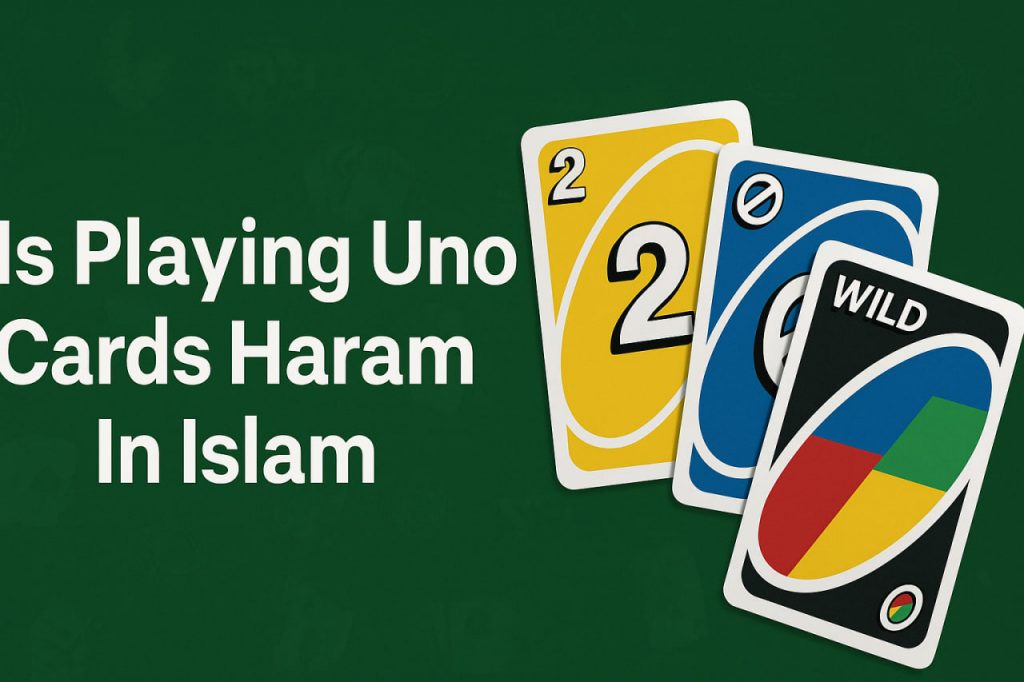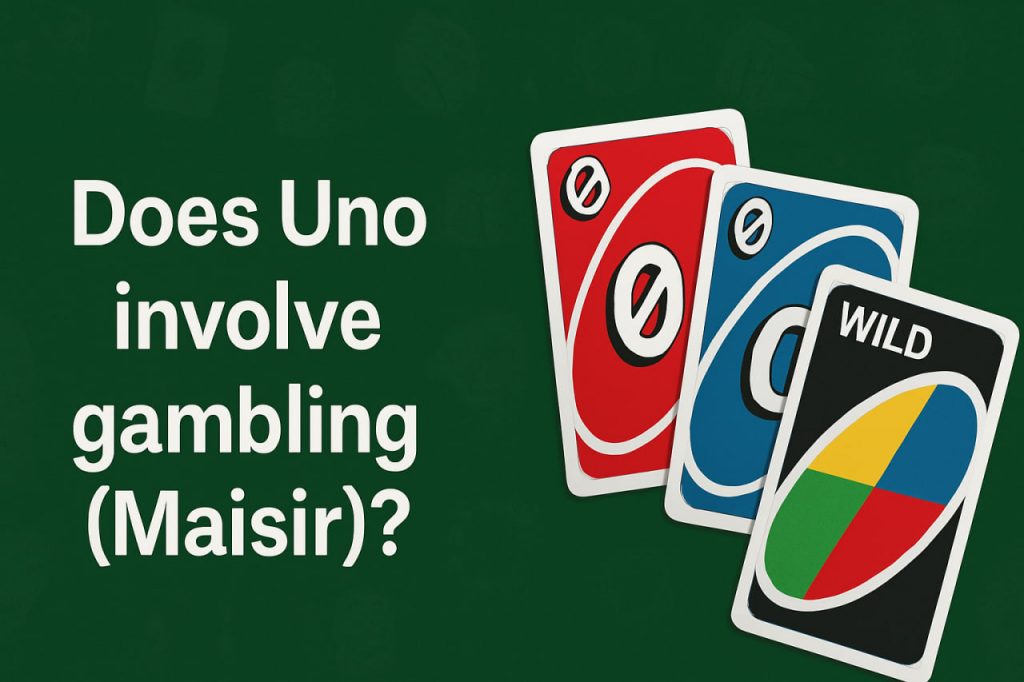Is Playing Uno Cards Haram In Islam?

In today’s ever-evolving world, where digital distractions, screen time, and various forms of recreation occupy much of our day-to-day lives, card games like Uno have secured a place as a favorite pastime in many households. From family game nights and school recesses to youth group activities and online gaming communities, Uno has gained massive popularity due to its easy-to-learn rules, engaging strategy, and versatility.
But for practicing Muslims who aim to live in accordance with Islamic principles, there’s a crucial question to consider: is playing Uno cards haram in Islam? As Muslims strive to ensure that every aspect of their lives aligns with Shariah law, including entertainment and leisure, it becomes essential to address this topic in depth.
This comprehensive article delves into the game of Uno through the lens of Islamic jurisprudence (fiqh), contemporary fatwas, the Qur’an, Sunnah, and scholarly interpretation. We aim to explore all aspects of the topic, presenting a clear and actionable understanding of whether Uno is halal or haram, and under what circumstances. We also address concerns from parents, youth leaders, and practicing Muslims who seek halal alternatives to common entertainment.
Understanding Uno: What Kind of Game Is It?
Uno is a fast-paced, turn-based card game first invented by Merle Robbins in 1971. It is now a globally recognized product distributed by Mattel and comes in multiple editions, including digital formats. The primary goal of Uno is to match cards based on number or color, and strategically use action cards like “Reverse,” “Skip,” “Draw Two,” and the famous “Wild Draw Four” to reduce one’s hand before opponents do.
Key features of Uno include:
- A family-friendly and non-gambling game
- No inherent betting or monetary exchange
- Easy to learn, inclusive for all age groups
- Encourages strategic thinking and focus
- Played in homes, schools, Islamic youth camps, and casual gatherings
- Supports different rule variations (house rules)
- Available as mobile apps, computer games, and physical decks
Uno is typically viewed as a harmless and enjoyable activity. However, in Islam, actions are judged not just by their outer forms but also by their intentions, consequences, and how they align with religious obligations and moral frameworks.
Play Halal-Approved Uno Cards Selected by Our Team
Uno is originally a family-style card game, but some online versions add real-money stakes, paid tournaments and gambling-like rewards. Our team has reviewed different Uno formats and selected a Shariah-verified option that keeps the fun, social gameplay while avoiding any betting or cash prizes.
This halal Uno experience focuses on strategy, quick thinking and friendly competition, making it a safe choice for Muslims who want to enjoy Uno without getting near gambling.
- ✔ Uno version reviewed and Shariah-checked
- ✔ No money, no betting, no prize pools or jackpots
- ✔ A halal-friendly way to enjoy Uno with friends and family
Note: This recommendation is based on our team’s Shariah analysis and is provided for educational purposes only. For personal rulings, please consult a qualified Islamic scholar.
Is Uno Haram? Questions You Need to Consider
Islamic rulings take a holistic view. An activity is not automatically halal or haram based solely on its appearance but must be analyzed based on multiple principles. Below are the essential questions we must ask when assessing Uno’s permissibility in Islam.
1. Does Uno involve gambling (Maisir)?

Gambling, or maisir, is strictly forbidden in Islam due to its exploitative nature and potential to create harm. According to the Quran:
“O you who have believed, indeed, intoxicants, gambling, [sacrificing on] stone alters [to other than Allah], and divining arrows are but defilement from the work of Satan, so avoid it that you may be successful.” (Surah Al-Ma’idah, 5:90)
Uno in its standard form does not involve gambling. There is no monetary stake, prize-based incentive, or risk-based outcome that would make it a game of chance in the Islamic legal sense. However, it becomes haram if money, rewards, or other valuable stakes are introduced into the gameplay. In that case, it would fall under gambling practices.
2. Does Uno resemble haram or sinful games?
Uno has a distinct identity that sets it apart from traditional playing cards used for gambling or adult entertainment. It is brightly colored, features numbers instead of symbols like clubs or hearts, and does not mimic the layout or format of poker or blackjack. Hence, Uno does not fall under the concept of tashabbuh bil fussaq (imitation of sinners), which can make other card games questionable or outright forbidden.
3. Does Uno distract from acts of worship or duties?
Uno becomes impermissible if it leads to the neglect of obligatory duties such as salah (prayer), family care, or other religious or moral responsibilities. The Prophet Muhammad (peace be upon him) warned about people who become heedless of their time and health. If Uno is played to the extent that it delays or replaces acts of worship, then the gameplay itself becomes problematic.
Games that delay religious obligations should be stopped or rescheduled to ensure that one’s priorities remain in accordance with Islamic teachings.
4. Is Uno a waste of time (Laghw)?
In Islam, believers are advised to avoid meaningless pursuits that do not benefit them spiritually or practically. Allah says:
“And they who turn away from ill speech (laghw).” (Surah Al-Mu’minun 23:3)
Uno, when played in moderation, can serve as a bonding tool between family members or friends. It can encourage healthy social interactions and teach patience and good sportsmanship. However, if it becomes addictive, consumes hours daily, or leads to procrastination and idleness, it is considered laghw and potentially makruh (disliked).
5. Does Uno encourage sinful speech or behavior?
Sadly, even innocent games can lead to negative behavior when players lose control. Yelling, arguing, swearing, or mocking others over a game violates Islamic manners (adab). The Prophet (peace be upon him) emphasized refined character, saying:
“The strong man is not the one who can overpower others, but the one who controls himself when angry.” (Bukhari & Muslim)
If Uno leads to fights, prideful taunts, or foul speech, it must be restructured or avoided altogether in that context.
Scholarly Opinions on Card Games
Islamic scholars evaluate card games using established legal principles. Though Uno is a relatively modern invention, the same principles apply:
| School / Scholar | Stance on Games Like Uno | Reasoning |
|---|---|---|
| Hanafi | Permissible if free from gambling and time-wasting | Emphasis on niyyah and avoiding sinful outcomes |
| Maliki | Makruh if overly distracting; halal in moderation | Focuses on productive use of time |
| Shafi’i | Permissible if not delaying obligatory acts | Encourages good etiquette and responsibility |
| Hanbali | Conditional permissibility | Each case assessed based on setting, intent, and consequence |
Most modern scholars support Uno’s permissibility when practiced in accordance with Islamic ethics and moderation.
When Playing Uno Becomes Haram

Though Uno is not inherently haram, it becomes haram when:
- ❌ Gambling is introduced through bets or prizes
- ❌ It delays or replaces obligatory acts like salah
- ❌ It is played in gatherings involving haram elements (music, mixed settings)
- ❌ Players engage in backbiting, swearing, or hostility
- ❌ It results in addiction, reducing productivity or spiritual growth
- ❌ It models bad manners for children or weakens moral development
Like many neutral actions in Islam, the outcome and surrounding circumstances determine the final ruling.
Is Uno Halal or Haram?
| Scenario | Verdict |
| Casual play without gambling or missed salah | ✅ Halal |
| Playing with money or material stakes | ❌ Haram |
| Regularly replacing prayers or Qur’an time | ❌ Haram |
| Promotes family unity, bonding, or stress relief | ✅ Halal |
| Causes fights, excessive play, or rudeness | ⚠️ Makruh |
| Played in haram environments or with immoral media | ❌ Haram |
| Used as an educational or bonding tool with adab | ✅ Halal |
Final Verdict: Is It Haram to Play Uno?
- Is Uno haram? ❌ Not in and of itself
- Is playing Uno haram? ❌ Only if it involves sin or distraction
- Is playing Uno cards haram in Islam? ✅ No, it is usually permissible
- Uno halal or haram? ✅ Halal with right conditions
- Is Uno halal in Islam? ✅ Yes, when played ethically
- Is it haram to play Uno? ❌ Only if it leads to neglect or sinful outcomes
Islam is a balanced way of life that recognizes the human need for rest and recreation. Uno, when enjoyed with Islamic manners and in a halal setting, aligns with that balance.
Tips for Keeping Uno Halal and Beneficial

- Prioritize prayers and obligations
- Limit game time to avoid addiction
- Play in family-friendly, respectful environments
- Avoid arguments or boasting
- Supervise children and encourage fair play
- Make the game a bonding or teaching tool
- Avoid any form of gambling or prize-based competition
The Broader Islamic Perspective on Entertainment
Islam permits enjoyment and fun within boundaries. The Prophet (peace be upon him) would joke with companions, allow games among children, and even race his wife. What matters is intention, moderation, and alignment with Islamic values.
Uno can fit well into a Muslim’s life if approached with mindfulness. It’s not just about whether it’s haram or halal, but whether it’s being used in a way that pleases Allah and enhances one’s deen and akhlaq (character).
Parents, teachers, and leaders should not only approve games but also supervise and mold them into tools of benefit. Used properly, Uno can build communication, empathy, patience, and discipline—all Islamic virtues.
Conclusion
So, is playing Uno cards haram in Islam? The short answer is: No, not inherently. Uno is halal under most circumstances, especially when played in moderation, with good manners, and without any sinful attachments.
Islam does not prohibit fun, but it requires that leisure activities serve a higher purpose or at least not detract from our purpose. Uno can be a halal, healthy, and joyful game when enjoyed with taqwa, balance, and sincerity.

User Reviews
Our family loves Uno, but I didn’t like the idea of playing versions that add paid tournaments or prizes. This site helped us find a Shariah-checked Uno that is completely halal and safe for everyone.
The halal Uno recommendation here is amazing. It keeps the fun and competitive spirit of Uno without any gambling or money involved. Great resource for Muslim families.
I really appreciate how clearly this website explains what makes some Uno apps problematic and then points to a Shariah-verified version. Now I can play with friends without worrying about haram features.
Before finding this page I didn’t think about Uno having gambling-style modes. The halal Uno option recommended here is clean, simple and perfect for Muslims who just want a fun card game.